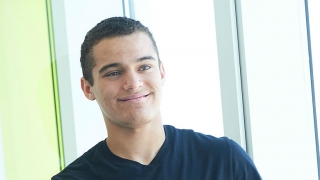Type 1 Diabetes: Ricky’s Story
Published on
Published on
Ricky was diagnosed with Type 1 diabetes at age 7. Today, he’s an exceptional lacrosse player and was recruited to play for a Division 1 college team. He embraces his diabetes and has learned to manage his condition as an athlete.
 Ricky is a star defenseman on his high school lacrosse team. He plays so well that he has been recruited by Providence College, a Division 1 school, even though he’s only a sophomore. In addition to playing sports at a high level, Ricky also believes in the importance of getting a strong education. He is interested in science and would like to become a dentist.
Ricky is a star defenseman on his high school lacrosse team. He plays so well that he has been recruited by Providence College, a Division 1 school, even though he’s only a sophomore. In addition to playing sports at a high level, Ricky also believes in the importance of getting a strong education. He is interested in science and would like to become a dentist.
Ricky has always loved sports, even as a young child. So a diagnosis of Type 1 diabetes at age 7 was scary news.
He remembers the day vividly. The family was in the car on a trip to an amusement park, about an hour’s drive from their home, when he told his parents he was thirsty. They gave him a drink of water, but 10 minutes later he was thirsty again. By the time they arrived at the park, he was asking for water every five minutes, and then he needed to go to the bathroom every five to 10 minutes.
“My parents were a little annoyed, thinking I was playing a joke,” Ricky remembers. “They asked me if I was playing with them. I told them I wasn’t kidding.”
Realizing something was wrong, they cut the trip short and headed back to Philadelphia to the emergency room at Children’s Hospital of Philadelphia (CHOP). That’s where they got the diagnosis: Type 1 diabetes. “My mom and dad were crying,” says Ricky. He didn’t know what to think. He’d never heard of diabetes before, but he could tell it was serious.
That was the start of Ricky’s relationship with the Diabetes Center for Children at CHOP. He spent a week in the Hospital to get his blood sugar level back within a healthy range. The Diabetes Center’s coordinated team approach helped Ricky’s family navigate all of the different challenges with managing diabetes.
During the stay, specialists helped the family learn how to treat Ricky’s medical needs, address dietary habits, and handle emotions. His family learned how to monitor blood sugar levels themselves and respond with insulin or food when the measures swung too high or too low.
“It was a struggle at first,” Ricky admits. “I didn’t adjust to it right away – the tests and needles every day.” He was also worried about his future: “I thought everything was over for me.”
With practice, though, Ricky and his parents got used to the treatment routine. Looking back on that time, Ricky believes that the obstacles diabetes threw in his path gave him extra motivation to succeed.
“Diabetes is pretty much the reason i'm going to be playing for a division 1 team. it gave me the drive to push harder. i wasn't going to let the disease determine my future. it wasn't going to stop me from living.”
In his first few years with the disease, Ricky relied on the treatment technology of the time: injections with doses of insulin carefully measured from a bottle into a syringe. His parents gave him the injections at home; a nurse helped when he needed them at school. The tools improved a little with the introduction of colored injection pens. But he still needed daily injections and began to build up scar tissue on his stomach.
At age 11, he switched to an insulin pump. That has made a huge difference, both in ease of treatment and in the number of injections. “I don’t get scar tissue now,” he says. He needs to move the infusion point to a new spot every three or four days, compared to the daily needle injections he was getting before. And the pump does the math for him.
Ricky still goes to CHOP for regular appointments. His key medical expert there is Melissa Rearson, MSN, CRNP, a Pediatric Nurse Practitioner whose specialty is helping young patients and their families manage diabetes. “She’s the reason I know how to control my sugar,” says Ricky. “She’s honest with me. If there’s a problem, she helps me figure it out.”
 Ricky is generous in his praise for and thanks to others — the medical team at CHOP, his parents, his coaches, his younger brother — but it’s clear that he deserves the lion’s share of the credit for his amazing success as an athlete and his positive focus in all aspects of his life.
Ricky is generous in his praise for and thanks to others — the medical team at CHOP, his parents, his coaches, his younger brother — but it’s clear that he deserves the lion’s share of the credit for his amazing success as an athlete and his positive focus in all aspects of his life.
When playing lacrosse, Ricky needs to take special care of himself in order to perform at his desired level. He monitors his glucose levels closely before, during and after games. Ricky knows that in an intense game with a lot of running, his glucose levels usually go down, so he prepares for a game by making sure the levels are high enough at the start to allow for them to drop. But he also knows from experience that the levels will sometimes go up.
When his teammates are on the sidelines resting or talking, Ricky is doing finger prick tests. His condition also forces him to pay close attention to hydration. His coach is an ally in his management, watching for signals from Ricky that he needs a quick break for water.
But his mental approach is probably the most important factor in his success. Instead of letting his diabetes derail his athletic ambitions, he took the diagnosis as a challenge to push harder.
He has this advice for other young patients who are dealing with a scary disease: “Teach yourself to feel lows and highs. Don't ever be embarrassed to check your sugar or do insulin. Most important, don't ever leave the house without a medical bracket or glucose tabs in your pocket.”